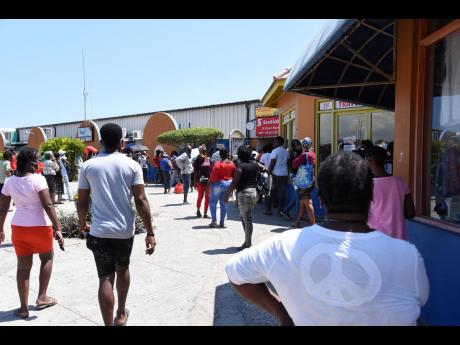Ransford Smith | Remittances cost human capital
As was noted in the first part of this essay, there are substantial social and economic costs in the annual loss of human capital necessary for national development, which makes possible the high level of remittances the country receives each year, totalling approximately 19 per cent of GDP.
Jamaica starts from a disadvantageous position. The 2021 Patterson Report on the Reform of Education noted that the island’s tertiary rate of enrolment, at 27 per cent, is well below other countries at a comparable level of development. And several studies over recent decades have indicated that as much as 80 per cent of Jamaica’s stock of tertiary=educated persons live and work outside the island. Indeed, the government’s 2017 White Paper on International Migration and Development, revealed that in the four decades between 1970 and 2013 just short of one million Jamaicans (996,208) migrated to three destinations – the United States, United Kingdom, and Canada. And in the decade since 2013, thousands more will have done so. This leads to the sobering realisation that over the past 50 years or so, and taking the certainty of undocumented departures into account, approaching half of the country’s population might have departed Jamaica’s shores. This is epic stuff, which inevitably has led to the hollowing out of the Jamaican middle class, to labour market disequilibrium, to social dysfunction, to a lack of diversity in social and cultural life, and to extremes of wealth and class in society.
GLOBALISATION
Unfortunately, as globalisation has gathered momentum in recent decades a near-casualty has been the issue of brain-drain in the field of development policy. Increasingly, this has been replaced by emphasis on fuzzier concepts such as brain circulation, network effects, and the global diffusion of knowledge. But it only takes common-sense to recognise that skilled and trained people who leave Jamaica’s shores – teachers, nurses, engineers, or middle managers – can never be substituted for in social, economic and cultural life – nor in the role they play in their communities – by Western Union transfers, or by the use of communications technology. There is also a perverse snowballing effect to losing those who might have become in time pillars of communities, since their departure weakens social bonds, degrades social capital and, by undermining the quality of life generally, encourages others to jump ship. The remittances they then send home, though valuable, orient a new generation outwards, materially, and psychologically, and the nation’s departure lounge only becomes more crowded!
This is why it is difficult to understand, much less to agree with, the idea sometimes put forward, that Jamaica should train its people for export. Beyond recalling that the ‘commodification’ of human beings was at the core of the slave and colonial experience endured by our ancestors, it makes no evident sense from the wider perspective of nation-building. There is an opportunity cost to training citizens to meet the requirements of foreign rather than the domestic labour market. And surely, national policy should be geared unwaveringly towards producing competitive and value-added goods and services for export – not the country’s own people!
Of course, no modern and liberal, democratic government can, or should seek to keep people penned within national borders. Jamaicans will migrate and will choose to live elsewhere – and this is their inalienable right if they meet the requirements of the receiving country. The task, indeed, the main obligation of a progressive Jamaican government, must be to seek to create within the country’s borders conditions so conducive to the aspirations and needs of citizens that many more Jamaicans than is now the case will – in accordance with Vision 2030 – voluntarily choose the island as the place “to live, work, raise families and do business.”
SUBSTANTIAL FALL
Unmistakable evidence that we are moving towards fulfilment of this strategic and desirable goal will be a gradual, and ultimately, even a substantial fall in remittances as a proportion of a growing and diversifying GDP. As an aside, The World Bank records Singapore’s share of remittances as a percentage of GDP, in the more than 15 years between 2005 and 2022, as 0.00 per cent!
We need to recognise that excessive dependence on remittances can be problematic! According to the Research Department of the Inter-American Development Bank, opining on its blog ‘Ideas Matter,’ shortly after the COVID-19 pandemic: “Remittances should remain a cushion softening the impact of unexpected shocks. But they should not become the main driver of economic development and macroeconomic stability.” And even more to the point: “remittances cannot in the long-term substitute for internally driven economic and social development”.
Indeed, the long-standing rhetorical question is pertinent: where on the planet is there a remittance-led economic success story? As remittances continue to grow, becoming in recent years Jamaica’s single largest net source of foreign exchange, and almost a fifth of the country’s GDP, this is a question that awaits an answer!
This article is second in the two part series on remittances – the first part, ‘Remittances and development: making silk purse out of sow’s ear?’ was published in In Focus, The Sunday Gleaner on July 14. Read the article here: https://jamaica-gleaner.com/article/focus/20240714/ransford-smith-remitt...
Ransford Smith was Jamaica’s ambassador to the World Trade Organization. In the 1990’s, he was permanent secretary in the Ministry of Industry, Investment and Commerce and subsequently, Commonwealth Deputy Secretary General. Send feedback to columns@gleanerjm.com.


